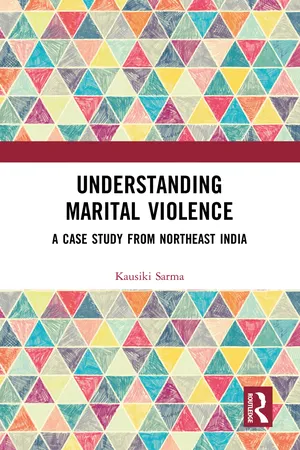
- 208 pages
- English
- ePUB (mobile friendly)
- Only available on web
About This Book
This book examines the roles and interconnections between structural factors and individual agency in marital violence, focusing on women in heterosexual marital relationships. With the overall aim of improving recognition and strengthening responses to marital violence, it underlines what occurs as marital violence and why it is possibly occurring in the manner it does, while simultaneously demonstrating how it is dealt with and resisted.
Based upon in-depth qualitative data focussing upon the experiences of women facing marital violence and key informants from Assam in Northeast India, this book sheds light upon four key areas. To begin with, what is named or recognised (and not recognised) as marital violence is assessed and a typology (and associated denials) informed by the capabilities approach is developed. Further, the re-victimisation that happens through and within both civil and criminal justice is explored. In addition to this, the existing structural context highlighting changes that occur at a broader economic, political, and social level, contextualising a society that is in transition, has been emphasised. To conclude, conditioned by distinct material-cultural constraints-enablers and acknowledging the role played by emotions, a temporal agential trajectory in response to marital violence is mapped, specifically through the concepts of Habitus and Reflexivity. In short, this book attempts to decolonise certain aspects of academic knowledge around marital violence by asserting the need to consider distinct natures and forms of violence and violations that occur within marriages and the acknowledgement of a spectrum of actions in the agential trajectory so that victims-survivors are not solely assessed by their decisions to stay or to leave an abusive marriage.
It will be of interest to scholars, students, professionals, and policymakers working within social work, social policy, gender studies, and violence prevention.
Frequently asked questions
Information
Table of contents
- Cover
- Half Title
- Title Page
- Copyright Page
- Dedication
- Contents
- Lists of figures
- List of tables
- About the author
- Foreword
- Acknowledgements
- List of abbreviations
- Glossary
- 1 Introduction
- 2 Typology of marital violence and its impact: A capabilities approach
- 3 Re-victimisation or secondary victimisation within and through the civil-criminal justice system
- 4 Structure as a context in marital violence
- 5 Agency in marital violence as hybridisation of habitus and reflexivity: Locating its characteristics, enablers, and deterrents
- 6 Conclusion
- Appendix: The practical implications of critical grounded theory (CGT) as methodology
- Index